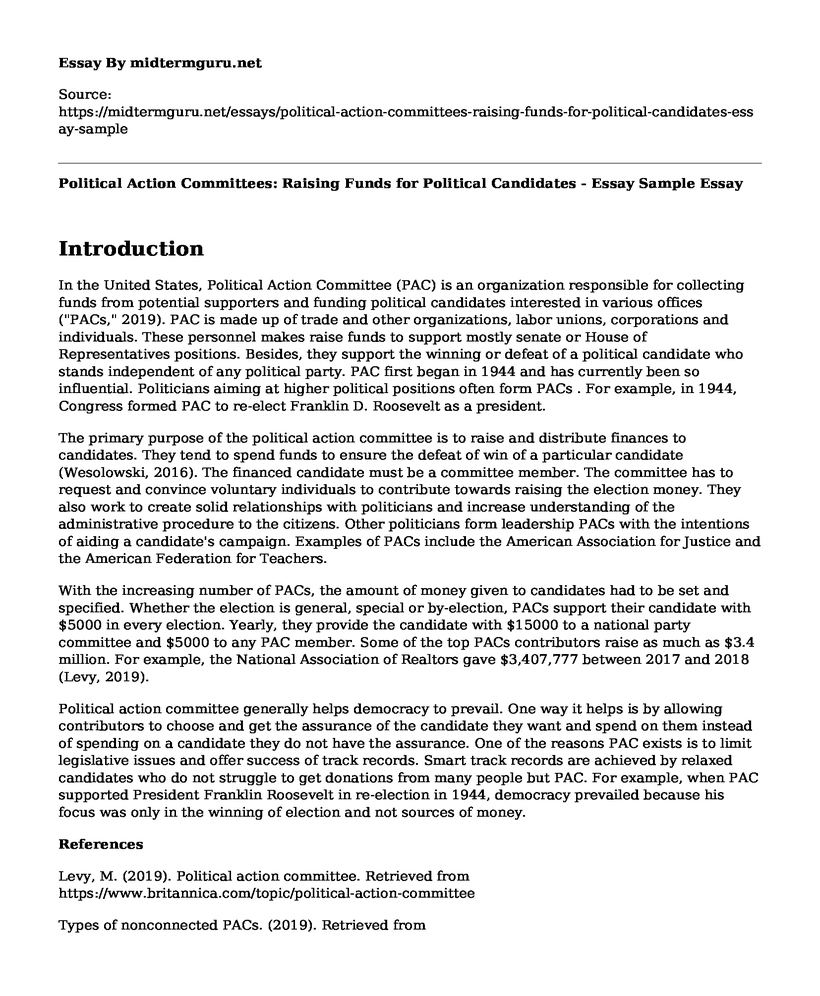Introduction
In the United States, Political Action Committee (PAC) is an organization responsible for collecting funds from potential supporters and funding political candidates interested in various offices ("PACs," 2019). PAC is made up of trade and other organizations, labor unions, corporations and individuals. These personnel makes raise funds to support mostly senate or House of Representatives positions. Besides, they support the winning or defeat of a political candidate who stands independent of any political party. PAC first began in 1944 and has currently been so influential. Politicians aiming at higher political positions often form PACs . For example, in 1944, Congress formed PAC to re-elect Franklin D. Roosevelt as a president.
The primary purpose of the political action committee is to raise and distribute finances to candidates. They tend to spend funds to ensure the defeat of win of a particular candidate (Wesolowski, 2016). The financed candidate must be a committee member. The committee has to request and convince voluntary individuals to contribute towards raising the election money. They also work to create solid relationships with politicians and increase understanding of the administrative procedure to the citizens. Other politicians form leadership PACs with the intentions of aiding a candidate's campaign. Examples of PACs include the American Association for Justice and the American Federation for Teachers.
With the increasing number of PACs, the amount of money given to candidates had to be set and specified. Whether the election is general, special or by-election, PACs support their candidate with $5000 in every election. Yearly, they provide the candidate with $15000 to a national party committee and $5000 to any PAC member. Some of the top PACs contributors raise as much as $3.4 million. For example, the National Association of Realtors gave $3,407,777 between 2017 and 2018 (Levy, 2019).
Political action committee generally helps democracy to prevail. One way it helps is by allowing contributors to choose and get the assurance of the candidate they want and spend on them instead of spending on a candidate they do not have the assurance. One of the reasons PAC exists is to limit legislative issues and offer success of track records. Smart track records are achieved by relaxed candidates who do not struggle to get donations from many people but PAC. For example, when PAC supported President Franklin Roosevelt in re-election in 1944, democracy prevailed because his focus was only in the winning of election and not sources of money.
References
Levy, M. (2019). Political action committee. Retrieved from https://www.britannica.com/topic/political-action-committee
Types of nonconnected PACs. (2019). Retrieved from https://www.fec.gov/help-candidates-and-committees/registering-pac/types-nonconnected-pacs/
Wesolowski, H. (2016). THE IMPORTANCE OF POLITICAL ACTION COMMITTEES. Retrieved from https://www.apaservices.org/practice/advocacy/state/leadership/political-action-committees.pdf
Cite this page
Political Action Committees: Raising Funds for Political Candidates - Essay Sample. (2023, Jan 20). Retrieved from https://midtermguru.com/essays/political-action-committees-raising-funds-for-political-candidates-essay-sample
If you are the original author of this essay and no longer wish to have it published on the midtermguru.com website, please click below to request its removal:
- Paper Example on Ethical Principles in Downsizing Departmental Workforce
- Essay Sample on Juvenile Delinquency Prevention
- Research Paper on Blood Spatter Interpretation
- Essay Sample on Importance of Intracompany Guides to Employees
- Essay Sample on Policing: Purpose and Organization
- Paris Climate Deal: Uniting Nations to Combat Climate Change - Essay Sample
- The Brazil Trip: Lessons Learned in a Week - Essay Sample







